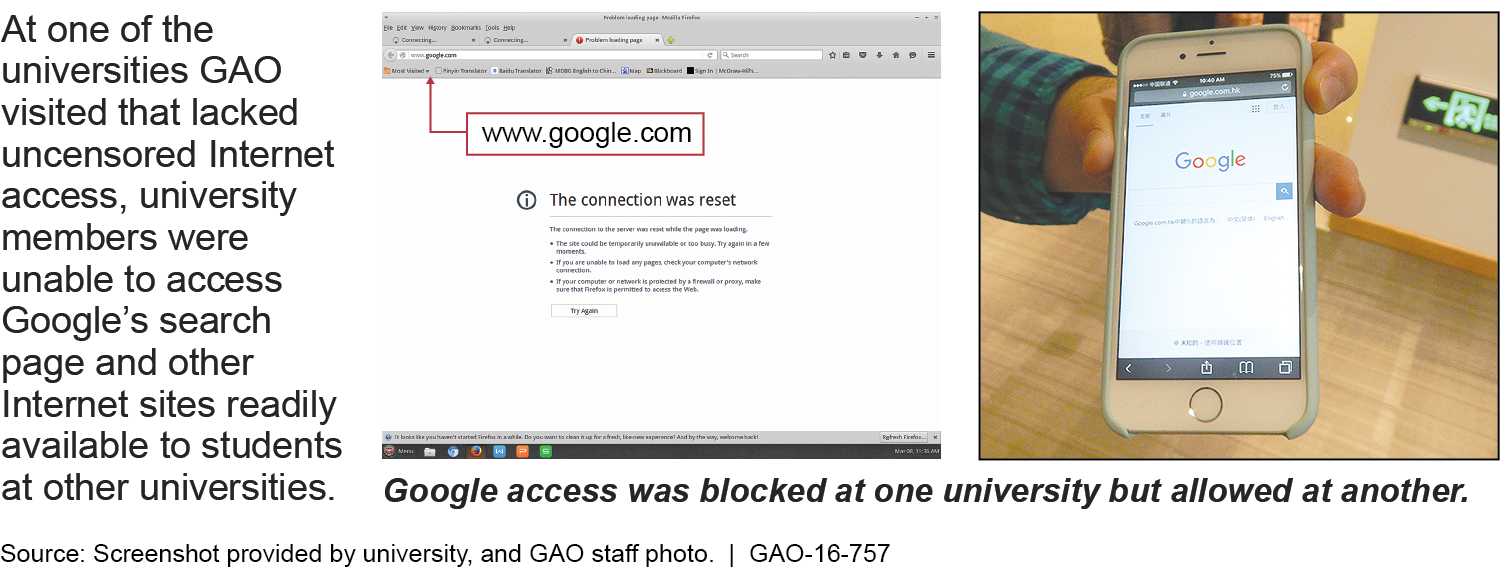China: U.S. Universities in China Emphasize Academic Freedom but Face Internet Censorship and Other Challenges
Highlights
View Chinese version of Highlights (PDF, 1 page).
What GAO Found
The 12 U.S. universities GAO reviewed generally reported receiving support for their institutions in China from Chinese government entities and universities, with limited funding from U.S. government agencies and other donors. Universities reported contributions from Chinese provincial and local governments and from partner universities for land, building construction, and use of campus facilities. Fewer than half of the universities reported receiving federal funding. Almost all of the U.S. universities said their programs in China generated net revenue for the university or had a neutral impact on its budget.
Universities' agreements with their Chinese partners or other policies that GAO reviewed generally include language protecting academic freedom or indicating their institution in China would adhere to U.S. standards. About half of universities GAO reviewed address access to information, such as providing faculty and students with access to physical or online libraries, though few universities' agreements and policies include language protecting Internet access. About half of the universities' policies include language indicating protection of at least one other key freedom—speech, assembly, or religion.
University members generally indicated that they experienced academic freedom, but they also indicated that Internet censorship and other factors presented constraints. Administrators said they generally controlled curriculum content, and faculty and students said they could teach or study what they chose. However, fewer than half of the universities GAO reviewed have uncensored Internet access. At several universities that lacked uncensored Internet access, students and faculty told us that, as a result, they sometimes faced challenges teaching, conducting research, and completing coursework. Administrators, faculty, and students also cited examples of self-censorship, where certain sensitive political topics—such as Tiananmen Square or China's relationship with Taiwan—were avoided in class, and of constraints faced by Chinese students in particular. Universities approved by the Chinese Ministry of Education as having independent legal status share characteristics—such as campuses located away from their Chinese university partner's campus and extensive student life programs—that may be correlated with greater academic freedom and other key freedoms.
Internet Access Varies at Different U.S. Universities in China

Why GAO Did This Study
In its Country Reports on Human Rights Practices for 2015, the Department of State (State) concluded that academic freedom, a longstanding concern in China, had recently worsened. At the same time, the number of U.S. universities establishing degree-granting institutions in partnership with Chinese universities—teaching predominantly Chinese students—has increased. While universities have noted that these institutions offer benefits, some academics and others have raised questions as to whether faculty, students, and staff may face restricted academic freedom and other constraints.
This report reviews (1) funding and other support provided to U.S. universities to operate in China; (2) the treatment of academic and other key freedoms in arrangements between U.S. universities and their Chinese partners; and (3) the experience of academic and other key freedoms by faculty, students, and staff at selected U.S. universities in China. GAO reviewed 12 U.S. universities that have established degree-granting institutions in partnership with Chinese universities; interviewed and obtained university documents and questionnaire responses; interviewed faculty and students; and visited the campuses of 5 institutions selected on the basis of their location, student demographics, date of establishment, and other factors. GAO also interviewed officials and obtained information from the Departments of Education (Education) and State. GAO makes no recommendations in this report. Education and State had no comments on a draft of this report.
For more information, contact David Gootnick at (202) 512-3149 or gootnickd@gao.gov.
